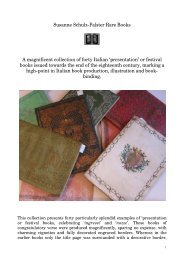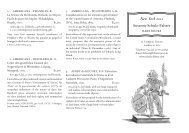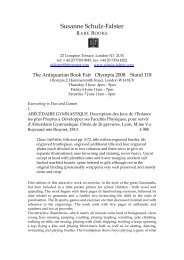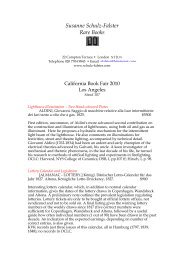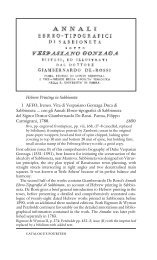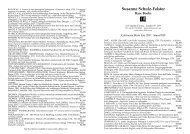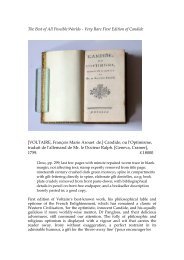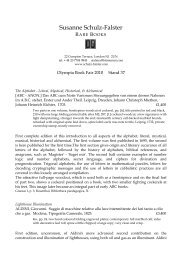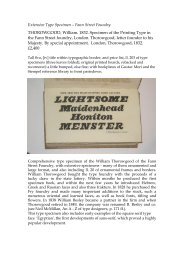Susanne Schulz-Falster Catalogue Ten - Schulz-Falster Rare Books
Susanne Schulz-Falster Catalogue Ten - Schulz-Falster Rare Books
Susanne Schulz-Falster Catalogue Ten - Schulz-Falster Rare Books
Create successful ePaper yourself
Turn your PDF publications into a flip-book with our unique Google optimized e-Paper software.
First edition, uncommon of this handy biographical dictionary of noble<br />
Venetian families. With its small format and colloquial style of writing, the<br />
work is clearly designed to be carried around. Brief entries give basic information<br />
on each family, details of their background, position and quite frequently<br />
current holders of the title. According to the preface and title, the<br />
information is mostly extracted from Zilliolo’s work, with additional information<br />
drawn from an anonymous manuscript. For a number of entries,<br />
the information is provided by the editor.<br />
OCLC and RLIN list New York Public Library and Harvard only; there appear to<br />
be diVerent issues of this work, since the New York Public Library copy measures<br />
24 cm, whereas this uncut one measures just 15.5 cm.<br />
318 [VENICE. ANON.] Squitinio della Liberta Veneta. Nel quale<br />
si adducono anche le raggioni dell’Impero Romano sopra la Città &<br />
Signoria di Venetia. Stampato in Mirandola, Giovanni Benincasa,<br />
1612. £900<br />
4to, pp. [ii], 77 [vere 75], [1] imprint, including Wnal blank; title within<br />
double border; typographic title vignette, head- and tail-pieces and<br />
decorated initials; paper lightly browned; contemporary full limp<br />
vellum, spine and upper cover lettered in ink; bookplate removed from<br />
inside front cover; a Wne copy.<br />
First edition, rare, of this famous satirical study of Venetian history and its<br />
political system, which appears to have been attributed to a wide number of<br />
historians and political authors, the most likely appear to be the Augsburg<br />
scholar Marcus Welser (1558–1614) and Alfonso de la Cueva Bednar<br />
(1572–1655).<br />
In this well-argued treatise the myth of Venetian liberty and independence<br />
is debunked. Instead it is argued that ‘La Serenissima’ was in fact always<br />
a dominion of the Empire and that therefore the emperor always<br />
retained his ancient rights. It also argued that Venice is all but free, the government<br />
is composed of the nobles only, with scant reference to the rest of<br />
the population. This critical publication was immediately banned by order<br />
of the Venetian senate, put on the index, and all copies in circulation were<br />
burnt (Libreria Vinciana 1013).<br />
Cicogna 894; Lozzi 6133; Libreria Vinciana 1014.<br />
Tail Piece<br />
319 [VERACI, Gaetano.] Cicalata sopra la Coda in forma di<br />
Lettera indirizzata alla Signora N.N. e di Rami allusive fregiata.<br />
[Florence], Campo Cauditano [for the author], 1765. £500<br />
Large 8vo, engraved frontispiece, pp. 49, [1], with two text engravings;<br />
browned throughout, with some marginal staining; uncut in<br />
contemporary pattern paper wrappers, spine lettered in manuscript,<br />
spine worn, but Wrm; later label and library sticker to upper wrappers.<br />
susanne schulz-falster rare books catalogue ten<br />
First and only edition of this rare mock-scientiWc panegyric on the ‘tail’,<br />
celebrating the birth of a male child. Illustrated with three evocative engravings<br />
the anonymous author wittily exploits the analogy between tails and<br />
the distinctive anatomical feature of male babies.<br />
This anonymous publication, where the author is disguised under the<br />
pseudonym ScarpaWco Codacci is a typical production of eighteenth-century<br />
Florentine literary academies.<br />
Melzi I, 205; Parenti, p. 45.<br />
320 VERNES, Jacob. ConWdence Philosophique. Londres,<br />
1771. £750<br />
8vo, pp. viii, 381; woodcut vignette to title; contemporary tan calf,<br />
spine decoratively gilt, gitl-lettered spine label; a very Wne copy.<br />
First edition, uncommon, of Vernes’ outspoken and well-written critique<br />
of the encyclopédistes and philosophes, in the form of ten letters. Vernes<br />
(1728–1791), theologian in Geneva, singles out Voltaire, materialist philosophy,<br />
especially LaMettrie and Holbach, and Rousseau. Immediate<br />
translations into German and English contributed to the wide circulation of<br />
this anti-materialist publication.<br />
Despite this strident criticism, Vernes remained friends with Voltaire and<br />
Rousseau, both of whom he had pilloried in his publication.<br />
Cioranescu 63193; a second edition was published in 1776.



